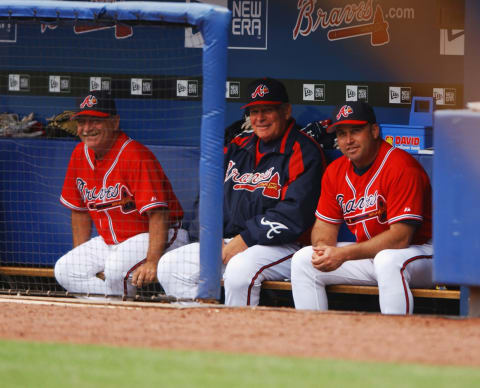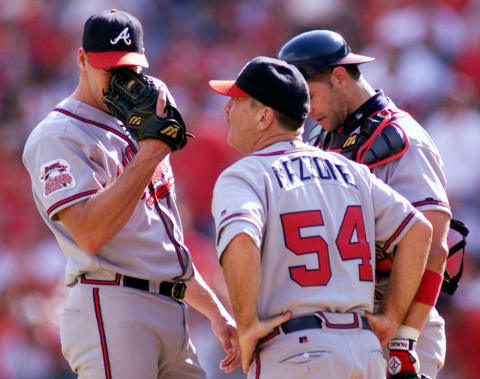Episode 2 of Atlanta Braves “Learning From Leo” Series Focuses on Command


Legendary Atlanta Braves pitching coach Leo Mazzone centers on the importance of command, consistency, and communication in the second episode of a three-part interview series.
Iconic Atlanta Braves pitching coach Leo Mazzone was never a fan of ‘giving in’ to a hitter.
To this day, it’s simply not his style.
One telling moment, in particular, during the Braves historic run of 14 consecutive division titles, he paints a picture of then future Hall of Famer Tom Glavine starring down the barrel of Kevin Mitchell’s powerful bat with two outs in the first inning and the bases loaded with the Braves trailing the Reds 1-0.
In a prime sampling of his mulish mentality, Mazzone moseyed to the mound to send Glavine a rather mystifying message: “Tommy, I want you to pitch to Mitchell like there’s nobody on, because there’s a base open.”
A dumbfounded Glavine replied: “I don’t know what the hell game you’re looking at, because last I looked the bases were loaded. Would you mind telling me what’s open?”
Mazzone, knowing full well the proverbial pond was filled with ducks, gazed out at Glavine and cynically countered: “Yeah, home plate.”
Glavine didn’t need a clue to take the hint. He simply said “Don’t give in? Right, Leo.”
And the pitching coach stoically shook his head.
In prototypical Glavine fashion, the lefty answered the call, retiring the next 18 batters in a row. The Braves won the game 5-2.
In episode two of the three-part “Learning From Leo” series, Mazzone regales us with more of the same poignant tales of the Braves dynamic trio of Hall of Famers. The interview series, produced by FlatGround Founder and CEO Rob Freidman (of @PitchingNinja fame) and college baseball scout and FlatGround Content Provider Josh Rudd, examines the pitching philosophy of the legendary coach and his mentorship with Furman University baseball pitching coach Kaleb Davis.
(Note: Prior to the release of this episode, it was announced Furman would be eliminating its baseball program due to COVID-19-related budget cuts).

Braves and Leo Mazzone: Command Masters
Here Mazzone expands upon the lessons learned from Johnny Sain in the first installment, preaching of pitcher consistency and command within throwing programs, the importance of making adjustments, sticking to routines, and, most of all, being an active listener.
“Command is the most important thing you have, and how do you teach that?” Mazzone ponders. “By having side sessions down in the bullpen.”
After all, Mazzone was never one to follow an instruction manual.
His pitching guidelines came from common sense.
Case in point: Mazzone rehashes the time one unnamed Braves executive confronted him prior to first pitch of a regular-season game to question why he was working with Steve Bedrosian on a side session. Mazzone, of course, encouraged his stagnant relievers who didn’t get in a game or warm up for two days to engage in side sessions to remain sharp and retain feel for their pitches.
“Gee whiz,” Mazzone lamented. “It’s not that difficult.”
Mazzone’s perspective, to this day, is built on persistence.
If a pitcher’s velocity was down, he didn’t care. Adjustments were to be centered on command, while emphasizing 80 percent of practice time on fastball feel, regardless of velocity.
The thought process here is that location is far more imperative to a pitcher than his “stuff,” a concept Mazzone inherited (and later mastered) as a young pitching coach from Hall of Famers Bruce Sutter and Ted Simmons.
In turn, he has passed that ideology down to Davis.
“At the college level, you get so handcuffed with what you should do with your relievers, because you have the mandatory off day, the travel day and then you have class,” said Davis, who keeps a notebook from the 1994 season that Mazzone gave him as inspiration for the way he manages his staff. “For us, it’s a set-in-stone rule, you never go more than two days without touching the rubber as a reliever.”
During the Braves remarkable run, Mazzone kept the evaluation process elementary from year-to-year. In spring training, it was often hard to tell if the Braves had just won the World Series the year before or if they had finished dead last.
“We had a saying,” Mazzone said. “Your most important pitch is always your next pitch, and your most important outing is always your next outing.”
But it was Mazzone’s modus operandi for maintaining healthy arms that set him apart.
With the big three, whether it was the middle of March or the dog days of August, routines never changed. Owning the down and away strike was vital, and too much rest in between sessions was risky.
Regulating effort was key.

Braves and Leo Mazzone playing 4D Chess
Whether it was Glavine’s stubbornness of not allowing the hitter or umpire to dictate his definition of the strike zone or Maddux’s agitated attitude if his location was off by an inch, command and precision forever played a pivotal role in the trio’s success.
In one incredible tale, Mazzone narrates the moment where Greg Maddux faced off against Luis Gonzalez, who simply owned the 300-game winner (Lifetime .325 average, 10 home runs, 23 RBI against Maddux). Mad Dog, fully aware of the track record, stubbornly said to Bobby Cox that in just two pitches he would get Gonzalez to pop out to third.
A pair of pitches later, the ball landed in Chipper Jones’ glove.
And, of course, there was the other story of John Smoltz kicking off a regular-season start against the Reds with 32 straight fastballs. After a rightfully frustrated Bobby Cox scorned Mazzone, the pitching coach asked Smoltz, “What the hell are you doing?”
Smoltz replied, “I’m setting them up for the playoffs.”
Still, the most revealing aspect of the episode was when Mazzone opened up about leaving Atlanta for Baltimore following the 2005 season.
In a rather candid moment, Mazzone said, “It was miserable. It was a completely different setup.”
Despite having an average rotation led by Erik Bedard and Jeremy Guthrie, a toxic culture and Mazzone’s admittedly aggressive approach entering the organization led to his shortcomings.
“In Baltimore, you never knew what the owner would do,” Mazzone said. “Players could come and voice their complaints. When that happens, you have no chance.”
Next. Gabbing Braves with GiraffeNeckMarc. dark
The final episode of “Learning from Leo” airs May 27 on Rudd’s YouTube channel. Prior to the release, check back with Tomahawk Take for a preview.